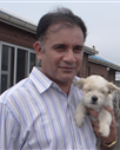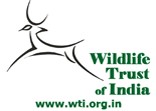
Dr NVK Ashraf – Chief Veterinary Officer
Dr Ashraf is the Chief Veterinary Officer and Vice President at WTI. He joined WTI in 2001 as the Coordinator of the Wild Rescue programme and became the programme’s Director in 2005. Under his leadership and supervision, for the first time in India, hand-raised rhino calves were relocated to Manas National Park from CWRC as part of IFAW-WTI’s rhino reintroduction programme. He also oversees rehabilitation of other temporarily as well as permanently displaced animals.
NVK Ashraf completed his Bachelors degree in Veterinary Science (BVSc) from Chennai in 1985. As a veterinary student, he says, his interest in comparative anatomy attracted him to wildlife.
After working for a couple of years as Assistant Veterinary Surgeon with the State government of Tamil Nadu, he joined the Wildlife Institute of India (WII) in 1989 to do his Masters in Wildlife Science, which he asserts has been one of his most memorable moments. For another two years at WII, he was associated with several projects, the principal among them being the short term survey he carried out on the status of the Malabar and brown palm civets.
In 1992, Ashraf joined the upcoming Coimbatore Zoological Park (CZP) where he was mainly associated with Zoo Horticulture and Zoo exhibit designing. He was instrumental in re-creating four vegetation types of Western Ghats in the zoo campus, including the tropical rain forest.
He joined WTI in 2001 as the Coordinator of the Wild Rescue programme and became the programme’s Director in 2005. Representing WTI, he visited the Environment Public Authority (EPA) of the State of Kuwait in 2003 to help prepare a schematic design plan for a wildlife rescue centre.
His interest in zoological park management and exhibit designing once again earned him a place in IFAW’s leading five-member team commissioned for renovating the Baghdad Zoo in 2003. Here, he was primarily responsible for the re-designing of the avian and mammalian exhibits. He braved the vagaries of a war zone to help animals and believes that “no matter what one’s political ideologies are, animals caught in the midst of a conflict are innocent victims who should not be made to suffer”.
Ashraf is instrumental in the creation of IFAW-WTI’s wildlife rehabilitation centres, the Centre for Wildlife Rehabilitation & Conservation (CWRC) and Centre for Bear Rehabilitation and Conservation (CBRC), and the rehabilitation projects associated with them. These include rescue and rehabilitation of Asiatic black bears in Pakke TR as well as in Manas NP, Hoolock gibbon in Panbari Reserve Forest, release of hand-raised elephants in Manas among others.
Of all his numerous achievements, Ashraf considers “leading a large contingent of wildlife veterinarians, here in WTI; and through them, reaching out to animals in distress in different parts of India,” as the one that he cherishes the most.
Author of a large number of scientific publications, Ashraf is a member of the Captive Breeding Specialist Group as well as the Veterinary Specialists Group of the IUCN/SSC.
